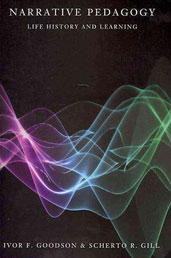Narrative Pedagogy
Learning and Narrative Pedagogy
Jennie is not married and has no children, but lives with a long term partner who is a craftsman. They have been together since they were seventeen. In her spare time, Jennie reads a lot, and helps young lone mothers. She is god-mother to a little boy, Zak, born to a young woman who was living in a hostel for the homeless. The two women met when Jennie was volunteering at the hostel one Christmas. Jennie helped with Zak’s delivery. Since then, she has been a mentor, friend and positive influence on the young woman who is now a qualified hairdresser and is raising Zak independently. Jennie said that she didn’t want to have children of her own as there are enough children in the world for her to love and care for. A close relationship with Zak fulfils her motherhood needs.
Scherto and Jennie’s conversational collaboration focused on the notion of academia, and what it meant for each of them. Scherto shared her story as an academic and how she thrives on being a researcher and academic author. Jennie, on the contrary, regards the academia as an exclusive and alienating world. Scherto shared her observation that to her, Jennie appears to be highly articulate and thoughtful. Her reflexivity and profound insights into her own work and life show high degree of intellectual capacity. These conversations made Jennie realise, with some reluctance, that her enrichment studies and training in higher qualification in healthcare management, NLP course and counselling qualification could all be considered academic.
These conversations formed the basis for them to collaborate and to locate Jennie’s story of academic failure within a broader educational system that is obsessed with exam results and intellectual achievements, and which takes these as the only measures for ‘success’. In Jennie’s words, ‘it totally ignores the student as a whole person, and neglects the diversity of human talents’.
In their later conversation, Jennie explains her change of attitude:
I have never linked what I do with anything academic and certainly had never perceived myself in the light of an intellectual. Perhaps it is all right now for me not to be too dismissive about academia. The term is very narrow any way, and the connotation it has simply puts many people off. Like you said, it is not the intellectual way of thinking that I am up against. Academia was a curse for me for many years. It always has an element of ticking the right box about something totally irrelevant to what I really care about. But in fact, it can be really stimulating. I have to say that I wouldn’t have enjoyed the NLP course that much if there hadn’t been the literature about neurological processes, human behavioral patterns, and writings about the way our language determines our thoughts etc. As you say, it is highly intellectual content and I love reading books of such intellectual weight. So I might be more open to intellectual stuff but I will never consider myself to be an academic, at least, not for the sake of being one.
